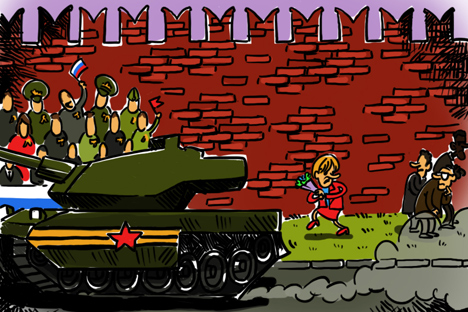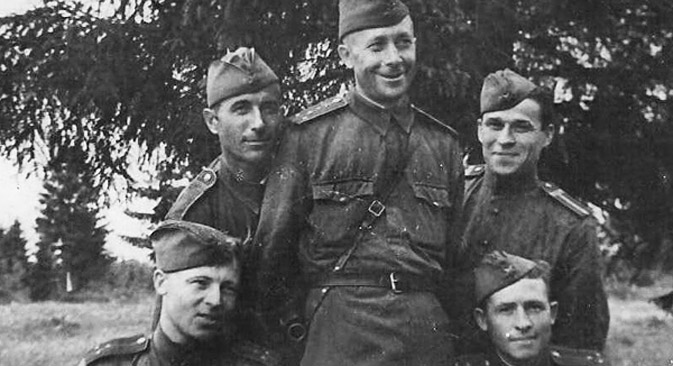Victory Day 2015: China, Merkel and the new Russian patriotism

Click to enlarge the image. Drawing by Konstantin Maler
This year Russia celebrated the 70th anniversary of victory in World War II (or the Great Patriotic War, as it is called in Russia) on May 9 on a scale that this day had perhaps never seen before. Red Square hosted a military parade that surpassed all the 23 preceding ones (after 1945, May 9 parades were not held again until 1965, and there were no parades between 1990 and 1995).
The ceremony featured 16,500 soldiers, 194 armored vehicles, including a "holiday gift" – the brand-new Armata tank – as well as 143 aircraft. Ten detachments of the armies of the CIS and Russia-friendly countries, including China, marched through Red Square. This was the first time that Chinese soldiers had participated in the event and their presence was designed to symbolize the strengthening alliance between the two countries in the face of the West.
Parades were also held in 25 other cities across the country, involving a total of 85,000 troops.
A symbol of the ‘new Russian patriotism’
The Russian leadership attached great political importance to the celebrations of the Victory anniversary. In the context of the confrontation with the West over Ukraine, the celebrations were intended to show not only the country’s military might, as last year's Olympic Games in Sochi were meant to show off Russia’s cultural and sporting power, but also the unity of the nation around Putin, the man who “returned Crimea” to Russia.
"If we defeated the Nazis at such enormous sacrifice, then why should we care about the sanctions and an economic crisis?" – this was the message that hovered over the celebrations. The large-scale, even pompous celebrations of Victory Day this year were precisely what was demanded by an overwhelming majority of the population, which now acutely feels the need to take pride in its country, even if the cause of this pride lies 70 years in the past.
Essentially, Victory Day has become a crucial part of the Russian national idea, the Russian identity. We can consider that the current anniversary was a victory for the "new Russian patriotism," an integral part of which is now not only pride in a glorious past, but also a strong anti-Western, primarily anti-American sentiment. The new way in which people are rallying around this renewed patriotic idea was expressed in particular by the mass events around the country united under the name "the Immortal Regiment," in which people marched in procession along the streets of their cities bearing portraits of their ancestors who were killed or participated in the war. In Moscow alone, up to a million people took part, and up to 12 million across Russia. Unlike other modern mass patriotic events organized, as a rule, by order, for the overwhelming majority of the participants this event was a totally voluntary initiative, something that came from the heart.
China's junior partner
Although the Kremlin invited 68 foreign leaders to this year’s celebrations, almost all the Western leaders refused to come, including those from the countries that were the main allies of the USSR in the anti-Hitler coalition. Each such rejection was taken by Moscow quite sensitively – as sensitively as all attempts to “belittle the role of the USSR” in the victory over the Nazis are now perceived. However, in the end, the fact that Putin and Chinese President Xi Jinping (with the St. George ribbon on his lapel, like almost all Russian politicians and officials during the celebrations) were sitting in the stands next to each other went a long way toward compensating for this.
Although Beijing plays, traditionally, only its own geopolitical game, the accented friendship with China is important for Moscow today in the confrontation with the West, even if this friendship is to be based on Russia playing the unfamiliar role of a junior partner. Earlier, Moscow never really emphasized China's role in the victory in World War II (the dates of the end of the “Great Patriotic War” and World War II are, strictly speaking, different). But now it is most likely that Putin will personally go to Beijing to celebrate the 70th anniversary of the final end of the war in September.
Contrary to expectations, Putin's speech at the parade was fairly low-key in relation to the West and the U.S. in particular. There were no direct “militaristic” attacks against the West, traditional for such speeches made by Soviet leaders during the Cold War era. Formally, Putin criticized attempts to “impose a unipolar world,” but made a conciliatory gesture by citing all major Western participants of the anti-Hitler coalition.
Merkel in Moscow
The celebrations' main intrigue as far foreign policy goes was the visit by German Chancellor Angela Merkel to Moscow. In the context of the refusal to attend by other Western leaders (Francois Hollande sent his rejection relatively late, as if he had been waiting until the last moment), it could be seen, of course, as an attempt to find new ground for the relations with Moscow (although critics saw "appeasing the aggressor" in this gesture).
Today, it is important that Merkel, as the main "curator" of EU policy, has regular direct contacts with Putin. At the same time we must not forget that for Germany and Merkel personally (as the daughter of a pastor and a former East German youth activist) the commitment to the policy of German repentance for the crimes of Nazism is an indispensable part of the political culture. In this sense, not coming to Moscow in a demonstrative way may have been harder than it would have been to come.
And no kind of handshake with Putin – avoided by other Western leaders – can be “forbidden” for the German chancellor in these conditions. Merkel seemed to invite the Russian president to also "repent" of his Ukrainian policy, making it clear (albeit indirectly) that it would be rewarded with at least a partial restoration of both political and economic relations.
The meeting was not a breakthrough. But something in its manner inspires hope that there will not be a resumption of large-scale hostilities in the southeast of Ukraine immediately after the holidays. Merkel and Putin appeared on quite friendly terms during the wreath-laying ceremony at the Tomb of the Unknown Soldier. The fact that it was a joint ceremony is an important gesture even by old Soviet standards.
They held a brief joint press conference, too. Although Merkel used a couple of harsh words about the “annexation of Crimea” and a threat that the war in Ukraine poses to the European security system, the leaders generally managed to avoid mutual attacks. Putin seemed to be conciliatory when speaking about the cultural, and economic cooperation with Germany, despite the fact that “there are certain problems.” Merkel, in her turn, found it positive to cooperate with Russia on Iran and Syria. She avoided issuing threats about new sanctions against Moscow (even when replying to a direct question, she evaded the issue).
What was important is her acknowledgement that against the background of the stalled implementation of the Minsk peace agreements on Ukraine, one cannot blame only one side for violations (previously it was almost always Moscow that was "guilty" of everything), just as the other side (Kiev) cannot be considered to have been fully implementing the agreement. For her part, the order in which the political conditions of the Minsk agreement will be implemented is clear (there has been recently an erosion of this interpretation, primarily on the part of Kiev); first elections in the southeast, and only then the transfer of the control of the Ukrainian-Russian border in the southeast to Kiev.
This does not yet mean that the EU, and Germany in particular, have already "tired" of Ukraine, to which there are questions not only regarding the non-compliance with the Minsk agreements, but also on the failure of the program of promised internal reforms in Ukraine, but this is already a significant evolution of the rhetoric that Merkel used even half a year ago. Whether these hints and new tone amount to a diplomatic breakthrough will become clear in about a month, when the question arises whether to extend or relax the EU sanctions against Russia, which were introduced in June 2014.
All rights reserved by Rossiyskaya Gazeta.
Subscribe
to our newsletter!
Get the week's best stories straight to your inbox

